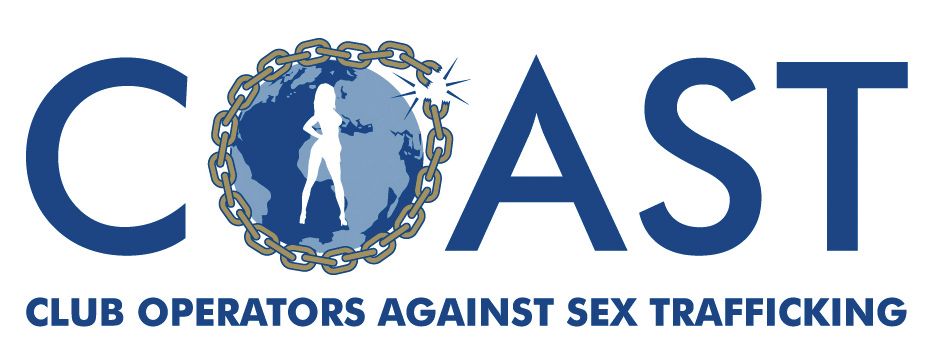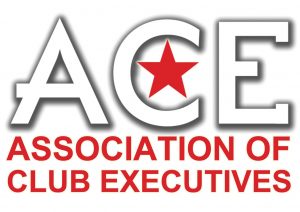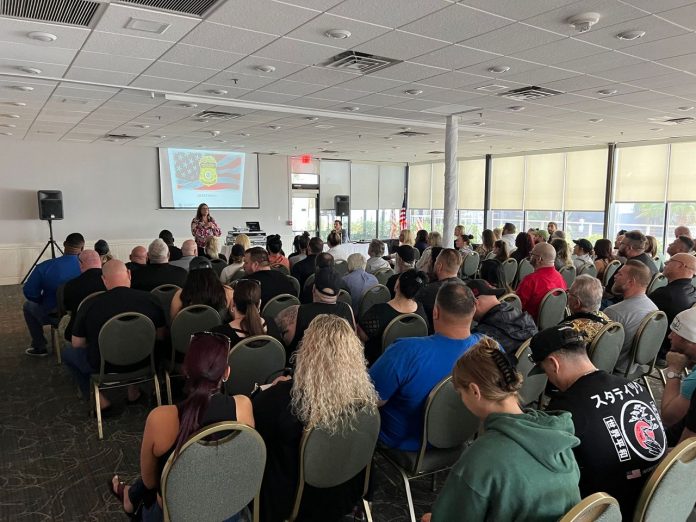Story by ED Founder Don Waitt
(NOTE: this story appears in the March 2023 issue of ED Magazine.)
COAST meetings.
You’ve heard of them.
But what are they?
COAST, which stands for Club Owners Against Sex Trafficking, is an outreach founded by the ACE National Board of Directors (Association of Club Executives).
The goal of the program is to help save lives through educating the industry about the crime of human trafficking. Law enforcement agencies across the U.S. lead COAST outreach, sharing valuable information about the indicators of human trafficking.
ED recently attended a COAST meeting in Tampa which drew about 110 attendees, including top club operators like Rick Hill of the Oasis and Brass Flamingo, Warren Colazzo of Thee Dollhouse, Don and Jimmy Kleinhans of 2001 Odyssey, Joe Redner of Mons Venus, and Jim Dato of Diamond Dolls. The meeting was set up and coordinated by the Kleinhans; it was the fourth COAST meeting held in Tampa.
ACE Executive Director Angelina Spencer opened the meeting and introduced the speaker, Jennifer Sillman, Group Supervisor, Tampa Division, Department of Homeland Security (DHS) Investigations. “Thank you for coming to this meeting. This is about saving a life,” said Spencer.
“Thank you for coming to this meeting.
This is about saving a life.”
– ACE Executive Director Angelina Spencer
Sillman noted that Florida is third in the country for the most tips called into the Human Trafficking Hotline. Still, she acknowledged that the vast majority of her cases involve hotels and Airbnbs, with only a few cases involving adult nightclubs.
What exactly is sex trafficking?
Human trafficking is split into two subcategories: sex trafficking and labor trafficking.
Forcing a woman, or a man, to work at an adult nightclub (or a regular club, or a hotel, or in a warehouse,etc.) is labor trafficking, while forcing someone to have sex against their will for commercial profit is sex trafficking.
Victims are found in legitimate and illegitimate labor industries, including sweatshops, massage parlors, agriculture, restaurants, hotels, and domestic service.
The key words here are “force, fraud and coercion.” Both sex trafficking and labor trafficking are present if the person is made to engage in those activities through force, fraud and/or coercion. If a victim is under the age of 18, no force, fraud or coercion needs to be proven because the victim is too young to consent.
Force can be physical assault or other forms of violence, forced abortions, lack of medical treatment. Fraud can be false promises of a better life or of a romantic relationship. Coercion can be threats against family members, debt manipulation, shame and embarrassment.
Human trafficking is not the same as human smuggling. “Trafficking” is based on exploitation and does not require movement across borders. “Smuggling” is based on movement and involves moving a person across a country’s border with that person’s consent in violation of immigration laws. Although human smuggling is very different from human trafficking, human smuggling can turn into trafficking if the smuggler uses force, fraud, or coercion to hold people against their will for the purposes of labor or sexual exploitation.
Why is the Department of Homeland Security involved?
DHS took on human trafficking as one of its priorities after 9/11. Said the DHS, “The United States has declared it a national priority to end human trafficking and the importation of goods produced with forced labor. DHS is on the frontlines of this fight, protecting the country and collaborating with our partners to stop these crimes.”
Why is DHS concerned with adult nightclubs?
DHS reports that human trafficking can and does happen at every type of business imaginable, in the United States and in every country abroad. DHS has also acknowledged that the incidents of human trafficking traced to adult nightclubs has been minuscule. Adult nightclub operators are used to being under the microscope of both authorities and the public and consequently more diligent about self-policing their own establishments.
So what happens at a COAST meeting?
Spencer will coordinate with local clubs and a law enforcement agency to have a subject matter expert lead a training seminar at a non-adult club venue such as a hotel conference room. Subject matter experts typically offer a slide presentation about human trafficking, its indicators, and what concerned citizens can do if they suspect someone is a victim of this crime. A Q&A session follows. Attendees sign up at the door before the meeting and receive a Certificate of Completion.
Who can attend a COAST meeting?

Anyone working in the adult nightclub business, including owners, partners, managers, bartenders, waitresses, club staff and entertainers.
How long is a COAST meeting?
Meetings can range from 45 minutes to two hours based on how many people attend and how many questions are asked. The Tampa meeting took less than an hour.
Do you need to get dressed up?
No! This is the nightclub business. Just about everybody who showed up for the Tampa meeting was in casual clothes. Plenty of shorts and T-shirts, which is understandable since most of the attendees were staffers who had just closed their clubs less than eight hours earlier.
How can you schedule a COAST meeting?
Contact ACE Executive Director Angelina Spencer at (202) 800-9109 or info@acenational.org. You’ll need to reserve a meeting room and reach out to the clubs in your market to let them know the meeting day, time, and location. Spencer helps with this.

Besides scheduling a meeting what needs to be done?
Not much. Just the meeting room and spreading the word.
Jimmy Kleinhans says 2001 Odyssey arranged the meeting space at the Godfrey Hotel, where the club also does two training seminars for their staff every year. They covered the rental cost, plus rooms and a dinner for the speakers. Once the day, time and location was locked in both Don and Jimmy Kleinhans started calling and emailing other club owners in the market to invite them to the meeting. Spencer also created a digital flyer that they sent out to Tampa area clubs.
What indicators of possible human trafficking should you be looking for?
—Does the same van deliver women to your club every day?
—Are the women not in possession of their travel documents?
—Have they been coached on what to say to police and immigration authorities?
—Is there pay being taken by someone else?
—Are they being deprived of basic necessities like food, water and sleep?
—Are they not allowed to socialize with family nor friends?
—Do they not have freedom of movement?
—Have they been physically assaulted (marks, bruises)?
—Is someone pretending to be their love interest?
—Have they been threatened with deportation?
Who to contact about an issue?
You should call 911 immediately if it appears the person is in danger. Try to get a covert picture of the person, or persons, you think are involved, as well as a license plate number if a vehicle is involved.
To report suspected human trafficking to federal law enforcement, call (866) 347-2423.
To get help from the National Human Trafficking Hotline, call (888) 373-7888. A great resource is the DHS “Blue Campaign” website at https://www.dhs.gov/blue-campaign. Blue Campaign is a national public awareness campaign designed to educate the public, law enforcement, and other industry partners to recognize the indicators of human trafficking, and how to appropriately respond to possible cases.
Want to know more about what ACE National is doing for the industry? Check out the website at: acenational.org





























